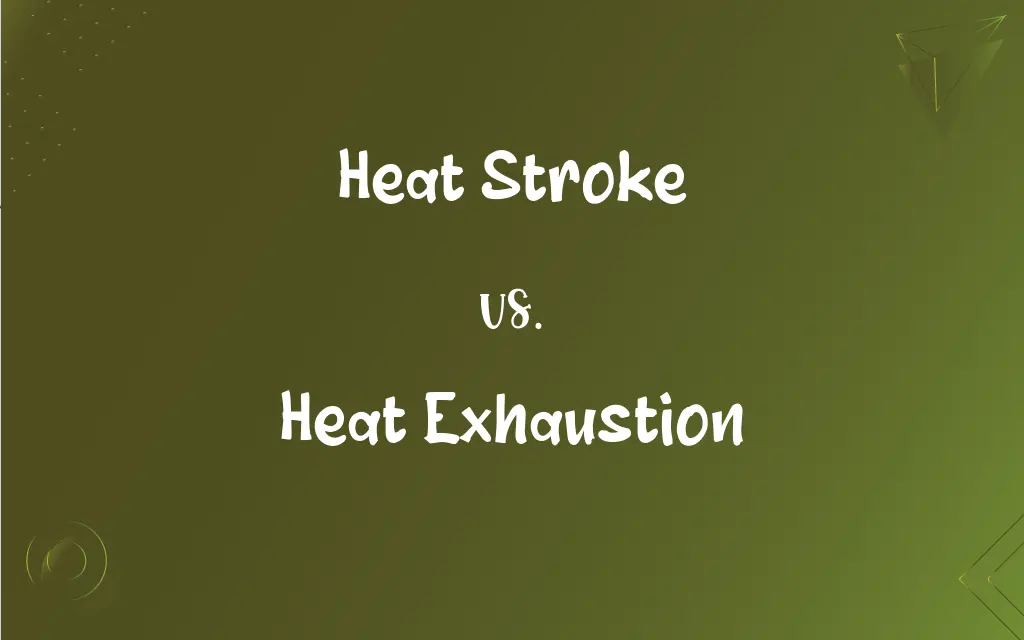Heat Stroke vs. Heat Exhaustion: What's the Difference?
Edited by Aimie Carlson || By Harlon Moss || Updated on October 7, 2023
Heat stroke involves a dangerous rise in body temperature and may cause unconsciousness, while heat exhaustion is a milder condition causing heavy sweating and a rapid pulse due to heat and dehydration.

Key Differences
Heat stroke is considered a severe medical emergency requiring immediate attention. When a person experiences heat stroke, their body loses the ability to regulate its own temperature. This condition progresses rapidly and can quickly become lethal if not promptly addressed. Heat exhaustion, though serious, is not as immediately perilous as heat stroke and tends to develop gradually over time.
On one hand, heat stroke manifests through a core body temperature of 104°F (40°C) or higher, and often includes symptoms such as dry skin due to lack of sweating, rapid pulse, and potential unconsciousness or coma. On the contrary, heat exhaustion features heavy sweating, weakness, dizziness, and a rapid but weaker pulse, hinting at the body’s struggle to cool itself amid dehydration.
The treatment strategy for heat stroke primarily includes rapid cooling of the individual’s body using methods such as immersing them in cold water. Time is of the essence when addressing this life-threatening condition. On the flip side, heat exhaustion can generally be addressed with rest, cool environment, hydrating fluids, and cooling measures like cool cloths, showcasing a less urgent but crucial intervention.
Both heat stroke and heat exhaustion are heat-related illnesses, but they occupy different spaces on the severity spectrum. Heat stroke is particularly hazardous to young children, elderly individuals, and those with pre-existing health conditions, making rapid intervention paramount. Heat exhaustion can act as a precursor to heat stroke if left unaddressed, illuminating its role as a vital early warning sign to prevent escalation into a more dangerous state.
Preventative measures against heat stroke and heat exhaustion are imperative, especially in consistently hot environments. It’s vital to stay adequately hydrated, take frequent breaks in cool areas, and be vigilant about not overexerting oneself in the heat to mitigate the risks of both conditions.
ADVERTISEMENT
Comparison Chart
Definition
A severe heat injury requiring emergency medical attention.
A condition marked by weakness, nausea, dizziness due to overheating.
Body Temperature
Typically above 104°F (40°C).
May be elevated but not above 104°F.
Symptoms
Confusion, rapid pulse, unconsciousness.
Heavy sweating, weakness, headache.
Urgency
Medical emergency, requires immediate attention.
Not usually a medical emergency.
Treatment
Immediate cooling, emergency medical response.
Rest, rehydration, moving to a cooler place.
ADVERTISEMENT
Heat Stroke and Heat Exhaustion Definitions
Heat Stroke
A critical condition marked by an abrupt and dangerous rise in body temperature.
During the marathon, a runner collapsed due to heat stroke when her body temperature soared.
Heat Exhaustion
An ailment characterized by weakness, dizziness, and palpitations due to extended heat exposure.
After feeling faint from heat exhaustion, she wisely chose to rest in a shaded area and hydrate.
Heat Stroke
A form of hyperthermia where the body’s cooling mechanisms fail.
Unattended, heat stroke can lead to dire consequences, affecting vital organs.
Heat Exhaustion
A milder form of heat-related illness that develops gradually from prolonged exposure to high temperatures.
Without proper precautions, long hours in the sun led to several cases of heat exhaustion among the construction workers.
Heat Stroke
A medical emergency requiring immediate cooling and professional intervention.
The paramedics swiftly immersed the heat stroke victim in an ice bath to lower his temperature.
Heat Exhaustion
A heat-related illness which can progress to heat stroke if not properly managed.
Ignoring the signs of heat exhaustion, the worker continued, putting him at risk for more severe conditions.
Heat Stroke
A heat-related illness characterized by a lack of sweating and rapid pulse.
Detecting heat stroke early can be pivotal in averting potential fatalities.
Heat Exhaustion
A state resulting from the body’s inability to cool itself sufficiently, often from strenuous activity in hot conditions.
The soccer player was benched due to heat exhaustion after pushing himself in the intense heat.
Heat Stroke
An acute condition often causing unconsciousness and requiring swift medical attention.
The lifeguard recognized the signs of heat stroke and immediately called for medical assistance.
Heat Exhaustion
A condition manifesting from excessive heat and dehydration, featuring heavy sweating.
The hiker experienced heat exhaustion after trekking in the scorching sun without adequate water.
FAQs
What first aid can be done for someone experiencing heat exhaustion?
Move them to a cooler place, encourage them to drink water, and cool them down with damp cloths.
How is heat exhaustion different from heat stroke?
Heat exhaustion is a milder condition that can develop after several days of exposure to high temperatures and inadequate hydration, while heat stroke is a severe, potentially life-threatening condition where the body overheats to 104°F (40°C) or higher.
Can heat exhaustion lead to heat stroke?
Yes, if heat exhaustion is left unaddressed and the body continues to be exposed to high temperatures, it may escalate to heat stroke.
Can heat stroke happen in the absence of direct sunlight?
Yes, heat stroke can occur without direct exposure to sunlight, especially in hot, enclosed environments.
Is rapid breathing a sign of heat stroke?
Yes, rapid, shallow breathing can be a symptom of heat stroke and requires immediate medical attention.
Can heat stroke cause permanent damage?
In severe cases, if not treated promptly, heat stroke can cause damage to internal organs and the brain.
What are the primary symptoms of heat stroke?
Primary symptoms include an elevated body temperature, altered mental state or behavior, alteration in sweating, nausea, and rapid heart rate.
What populations are most at risk for heat stroke?
Infants, the elderly, athletes, and outdoor workers are among the most susceptible to heat stroke.
How can one prevent heat exhaustion and heat stroke?
Prevention involves staying hydrated, avoiding exertion during the hottest parts of the day, and staying in air-conditioned environments when possible.
Is it possible to recover fully from a heat stroke?
With rapid and adequate treatment, many people recover fully from heat stroke, but some might experience lingering effects.
Is rapid cooling advisable in treating heat stroke?
Yes, rapid cooling is a critical step in treating heat stroke to lower the body temperature as quickly as possible.
Are athletes training in the heat acclimated to prevent heat exhaustion and heat stroke?
Athletes often undergo a process of heat acclimatization, but they are still susceptible to heat-related illnesses if precautions are not taken.
What is heat stroke?
Heat stroke is a serious, life-threatening condition caused by the body overheating, often as a result of prolonged exposure to or physical exertion in high temperatures.
Can hydrating prevent heat stroke and heat exhaustion?
Adequate hydration is crucial for preventing heat-related illnesses by helping the body cool itself.
Are heat-related illnesses only a risk in the summer?
While more common in summer, they can occur anytime and anywhere the conditions allow for excessive heat exposure or exertion.
What clothing is advisable in hot weather to prevent heat stroke and heat exhaustion?
Lightweight, light-colored, and loose-fitting clothing is recommended to reflect heat and allow the body to cool.
Is vomiting a common symptom of heat exhaustion?
Yes, vomiting can be a symptom of heat exhaustion and signals a need for immediate attention to prevent escalation to heat stroke.
Does acclimatization to hot weather reduce the risk of heat-related illnesses?
Yes, gradual acclimatization can enhance the body's ability to cope with heat, but it does not eliminate the risk.
How quickly can heat exhaustion turn into heat stroke?
Heat exhaustion can escalate to heat stroke within 30 minutes to an hour if corrective actions are not taken.
Can medications increase the risk of heat stroke and heat exhaustion?
Certain medications can impair the body's ability to regulate temperature or cause dehydration, increasing risk.
About Author
Written by
Harlon MossHarlon is a seasoned quality moderator and accomplished content writer for Difference Wiki. An alumnus of the prestigious University of California, he earned his degree in Computer Science. Leveraging his academic background, Harlon brings a meticulous and informed perspective to his work, ensuring content accuracy and excellence.
Edited by
Aimie CarlsonAimie Carlson, holding a master's degree in English literature, is a fervent English language enthusiast. She lends her writing talents to Difference Wiki, a prominent website that specializes in comparisons, offering readers insightful analyses that both captivate and inform.































































